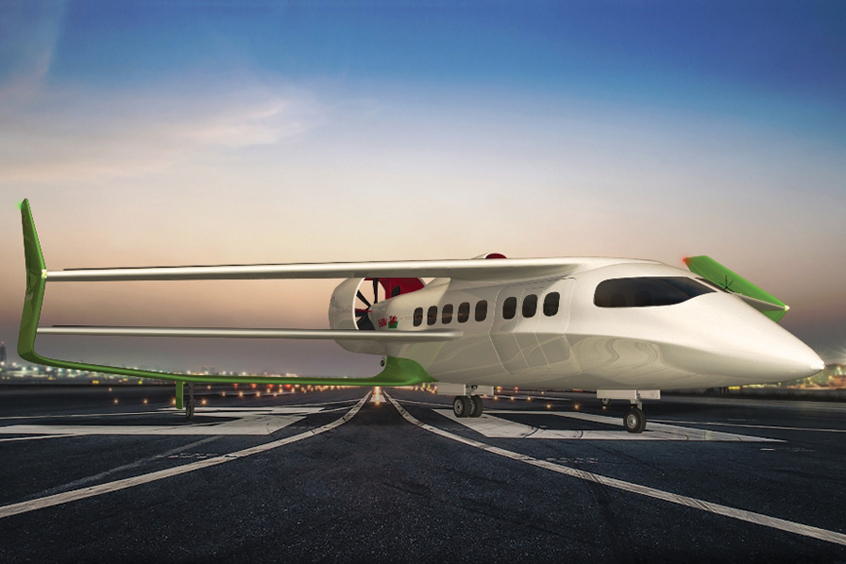Why visit ACE ’25?

UK-based start-up Faradair intends to certify its 18-seat hybrid electric BEHA aircraft (Bio Electric Hybrid Aircraft) by 2025 for passenger operations.
Designated the BEHA_M1H, the hybrid-powered machine utilises a design patented triple box-wing high lift configuration, delivering STOL capability by requiring less than 300 metres of runway. Featuring twin contra-rotating propfans within a vectored thrust, BEHA_M1H also includes an acoustic reduction duct that improves efficiency and reduces noise to a target of 60 dB at take-off.
After four years of development and both simulated and scale model testing, the design has evolved into a utilitarian configuration, capable of carrying 18 passengers or three LD3 cargo containers, with an internal payload capability of five tonnes.
The aircraft will be able to change configuration in 15 minutes from cargo to passenger and vice versa and the company is already in discussion with potential civilian and non-civilian customers. The aircraft is expected to connect London and Manchester in 42 minutes at a cruise speed of 230 mph – the HS2 railway line would take one hour and eight minutes by comparison.
As one of the earliest hybrid electric aerospace start-ups founded in 2014, Faradair has survived thanks to angel investment funding and partner input to develop its design. Unlike many E-VTOL projects currently proposed, the Faradair BEHA is a traditional aircraft, certifiable to existing Part 23 standards and able to operate from existing airfields as well as short fields. Its hybrid propulsion system combines electric motors with a turboprop engine and Faradair claims that this will result in lower operating costs, lower emissions and increased safety redundancy. The aircraft will use existing battery technology for emergency power and ground operations.
Last year Faradair secured the support of the All Party Parliamentary Group for General Aviation with 172 MP members led by Grant Shapps MP. Shapps says: “The company vision for a British-built aircraft that is able to deliver a range of roles both in civilian and non-civilian configuration is fascinating. The prospect of hybrid-electric flight and the ability for people throughout the UK and around the world to fly regionally as simply as taking a bus, is a future that opens up so much regional growth benefit opportunity. Most importantly, Faradair reminds us of our history in aerospace innovation and how we may rebuild aircraft manufacturing facilities from general aviation airfields currently under threat of closure.
“I genuinely believe the Faradair BEHA is an exciting opportunity for the UK, both in civilian and non-civilian configuration and I hope we will see this new British aerospace manufacturer grow, develop and create jobs with the appropriate backing and funding to prove that the UK can continue to design and build world class, whole aircraft systems.”
Faradair MD Neil Cloughley adds: “It's been a rollercoaster. Our angel investors and families have kept us going when other projects have breezed through funding rounds, but we always knew the market would come back to us when people understood the economic viability of the aircraft design. So many of the constraints surrounding E-VTOL and UAM simply do not apply to our vehicle and that is why as a result we will be able to deliver mass transit regional air mobility at a price that everyone can afford.
“We have always believed in the opportunity of hybrid propulsion to help reduce noise and operating costs in a specifically designed airframe optimised for regional flight capability, based on our management team's experience of the commercial aircraft market. The BEHA_M1H variant will allow operators the ability to provide viable air transport services including scheduled commuting flights, flight training and charter by day and the ability to use the quiet flight characteristics and payload capability for cargo operations at night. This opens market opportunities not served by existing aircraft, due to the lower noise signature and load capability. Our hybrid propulsion system mixes the proven capability of existing turboprop engines that could be run on biofuel if desired, with the fuel saving and increased safety opportunity of additional electric propulsion.”
Faradair intends to offer a fully electric powered variant of the BEHA as battery technology evolves but in the meantime, hybrid propulsion offers an immediate progression into the 'more electric aircraft' environment, helping to reduce carbon footprint and noise.
“Our order book is now open and we look forward to working with potential customers and airport operators, as we begin the build of our first demonstration prototypes later this year, intended for flight trials by 2022. It has been an incredible journey to date, but it is only just beginning and BEHA is going to help put British aircraft manufacturing back on the map,” concludes Cloughley.